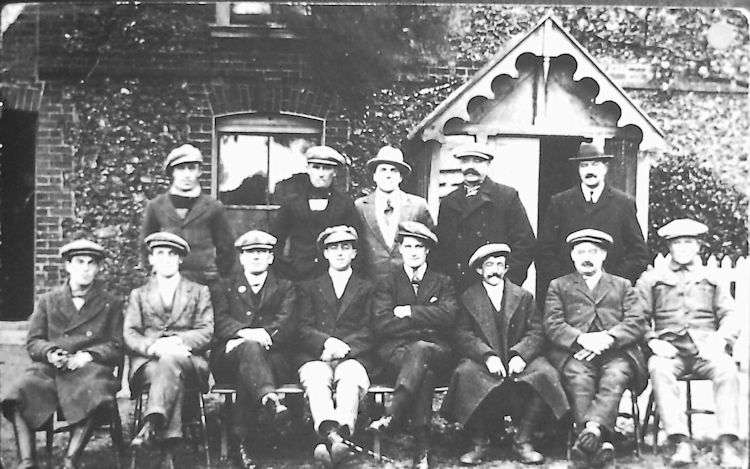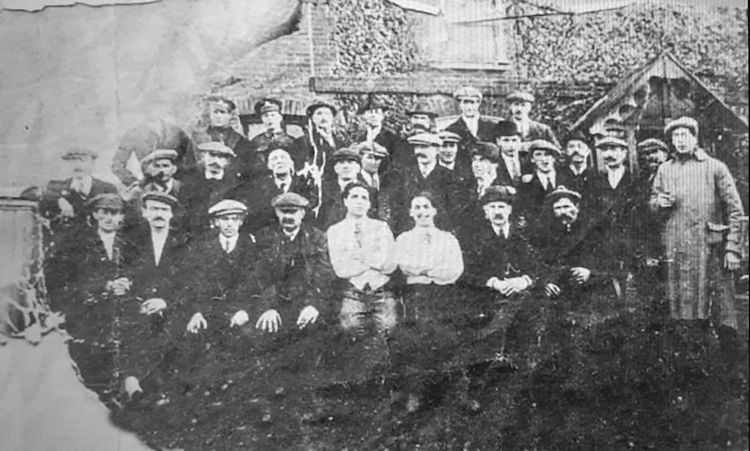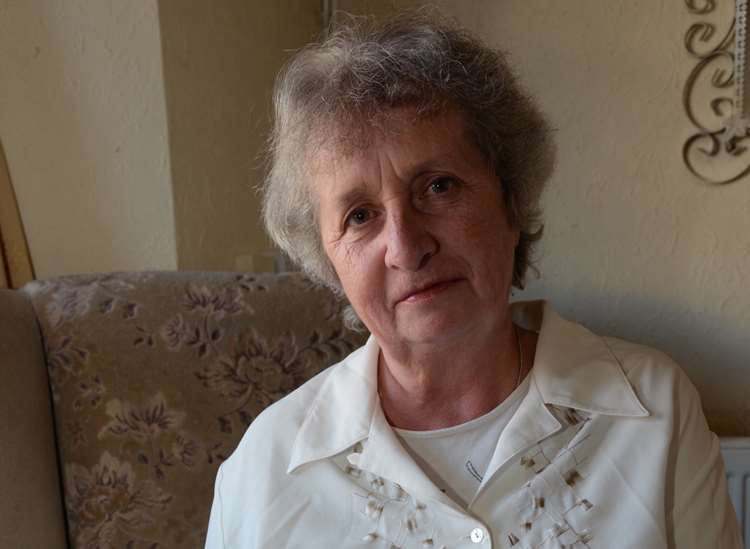|
47 Garlinge High Street
Garlinge
Margate
01843 449903
https://whatpub.com/rodney

Above photo, date unknown. |

Above photo, old pub pre 1926. |

Above photo, pre 1926. People in photo, as yet unknown. |

Above photo, date unknown. |

Above photo, date unknown. |

Above postcard, date unknown. |

Above photo, 1972. |

Above image from Google Maps, July 2012. |

Above photo, 2025. |

Above beermat, circa 1970's. Kindly sent by Mike L. |

Above photo, pre 1926. |

Above photo, circa 1928. Gentleman second from left with X is boot-maker
William Burgess. |

Above outing September 1933. |
|
Kentish Weekly Post or Canterbury Journal 25 June 1819.
DIED.
Lately, in the workhouse, Margate, Mrs. Sarah Mann, aged 65 years, many
years of the "Rodney" public house, in that town.
|
|
From the Whitstable Times and Herne Bay Herald, Saturday 12 January, 1867. Price 1d.
INQUEST.
An inquest was held at the “Rodney” public house, Monday week (before
Mr. Coroner Payn, of Dover), on the body of an agricultural engineer,
George
Setterfield, whose death took place on Saturday morning under the
following circumstances. The first witness, Jane Setterfield, said she
was the wife of the deceased, who resided at Garlinge. He was 35 years
of age. He had always appeared to be well in health, until the last two
or three months, when he seemed to be rather ailing, being at times a
little better and at others worse. He complained of a pain in the right
aide of his chest and his back. On Friday evening she arrived home,
having been away since Wednesday. Deceased met her at the “Hussar,”
(where she arrived by the omnibus), and carried her baby home. He had
his supper and went to bed between nine and ten o'clock. Witness was
with him all night, and got up on Saturday morning about six o'clock
leaving the deceased in bed. He then said he felt better than he had in
the night, but he still complained of a pain in his chest and side; and
said he had been retching, and his throat felt sore, as if he would be
choked. At about eight o'clock she gave him his breakfast, and in about
half-an-hour she went up to him again, when he did not answer her or
take any notice, and she found that he was dead. She did not know any cause herself of his death. He went to Hr. Hunter,
surgeon, on the 17th of November, but had not been attended since. He
was a steady, sober man. John March, a farm bailiff at Hartsdown, said he had known the deceased
for the last eight or ten years. He last saw him alive on Friday
morning, when he came to him (witness) to see about a job of thrashing,
and witness bargained with to come as that morning (Monday). Witness
asked him how he was, and he said he was better, but could not get rid
of a bad sensation in his side. They then parted, and he had not seen
deceased since. He believed him to have been a steady, sober,
industrious man. Mr. W. F. Hunter, surgeon, of Margate, said he was sent for to see the
deceased on Saturday morning, about ten o'clock. He went immediately,
and when he arrived he found that life was extinct. The body was still
warm and deceased could only have been dead a very short time. The face
was quite calm and the position of the body natural. The lips were pale
and there was a general bloodless appearance about the face, which also
had a very bronzed appearance, which, together with the pain in the
side, might indicate disease of the liver. Deceased consulted him on the
17th of November last, but as he came only once, he had no distinct
recollection of the case. He believed, however, that deceased complained
then of a pain in his side and chest, and he thought he (witness)
directed his attention to the action of the heart, and he found it to be
feeble and hurried, but he did not recollect that he discovered any
symptoms of organic disease. He found on referring to the prescription
book that the medicine he ordered deceased was of a tonic and
anti-spasmodic character. The circumstance of his death seemed to point
to a sudden failure of the heart's action; but it was impossible to
speak with any degree of certainty, unless after a post mortem
examination. There did not appear to be anything the least suspicious
about the circumstances of his death. The Coroner expressed his opining that the evidence was sufficiently
clear, without having a post mortem examination, and the jury returned a
verdict that the deceased died from natural causes. |
One time Cobbs tied house. Cobbs were founded in 1673, but Whitbread
took them over early 1968 and closed the brewery later that year.
I have seen reference to 1926 Old Welsden Road and the suggestion that a
new pub was built in that year.
|
From the
https://www.kentonline.co.uk By Keith Hunt, 26 August 2015.
David and Derek Stembridge, of Margate, locked up for attacking pub-goers at
The Rodney pub in Garlinge.
A manipulative bully, who began a punch-up at his 50th birthday
celebrations, has been jailed for nine years.
David Stembridge had claimed that during the fight at a Garlinge pub,
his son Derek was being attacked.
But during the ensuing scrap at The Rodney, the burly Stembridge
“forearmed” one person, punched another in the back, hit another in the
face and put his foot on the face of a man on the floor.

David Stembridge has been jailed for nine years.
Sentencing at Maidstone Crown Court, the judge, Recorder Jason
Dunn-Shaw, told him he was a manipulative bully who had attacked an
innocent man.
Following the trial at Canterbury Crown Court, the jury rejected
Stembridge’s account that he had been acting in self-defence.
They convicted him and his son, then 20, of wounding “peacemaker”
Michael
Goodchild with intent.
Derek Stembridge was sent to a young offender institution for
four-and-a-half years but has since been moved to prison after turning
21.
The dad had claimed that had he wanted to inflict serious harm, he would
have been facing a charge of murder.

Derek Stembridge has been locked up for four and a half years.
The judge added: “You related to the jury how much blood could be
spilled from the mildest head injury.
“Such was your conceit at your prowess as a fighter that you teetered on
the brink of bragging about your previous victorious bare-knuckle
encounters. It was a most pathetic display.”
The judge praised eye-witness and Thanet football referee Joanne Park
for her courage.
Commending her for a £300 High Sheriff’s Award, he said the barmaid had
been “level-headed and courageous in the face of a terrifying
situation”.
He said that Ms Park had telephoned the police and given them a running
commentary.
David Stembridge, who is 51 now, and Derek Stembridge, both of Dane
Valley Road, Margate, had denied the offences.
David and Derek were also each convicted of another assault on victims
Ian Walker and Ian
Williams.
David’s daughter Kayleigh, 26, of Kent Road, Margate, who was pregnant
at the time of the incident, was acquitted of wounding but the jury
found her guilty of assaulting Rebecca Beach.
She was given a five-month jail sentence, suspended for 18 months.
The jury heard how father and son began “squaring up to each other”
during the late-night party celebrations.
But both turned on other pub-goers who intervened to keep them apart,
punching, kicking and stamping on Mr Goodchild, described by prosecutor
Richard Scott as a “peacemaker”.
The judge told Derek, who is a talented footballer, he had sympathy for
him after hearing how he had urged his father to go home that night.
He told the youngster, who dreamt of becoming a Royal Marine: “Your
conduct was inspired by a misplaced loyalty to your father.”
|
|
From the
https://www.kentonline.co.uk By Lowri Stafford, 2 November 2017.
Birchington woman Teresa Geale denied benefits for 10 months.
A disabled woman was denied vital benefits for 10 months after health
assessors cancelled her appointment – and then penalised her for failing
to turn up.
Teresa Geale, who has several serious conditions which prevent her from
working, was on a bus five minutes away from the work capability
assessment session in Canterbury when she received a voicemail telling
her staff were running behind and it would have to be re-arranged.
But a few days later, the 63-year-old received a letter asking why she
did not attend.

Teresa Geale.
Despite explaining the situation and providing proof, she was told by
the Department for Work and Pensions (DWP) that because she had failed
to show without good reason, her entitlement to Employment Support
Allowance (ESA) had ended.
The former pub manager’s income was slashed as a result, forcing her to
make cutbacks and sign on at the JobCentre – despite doctors deeming her
unfit to work.
Speaking from her home in Epple Bay Road, Birchington, she said:
“Financially, I was getting half of what I was before.
"I had to deny myself things, make food last longer, and so on. The
stress of it also made my illness worse.”
Almost a year on, Mrs Geale has now won a legal battle to have her
benefits reinstated after a tribunal judge took less than five minutes
to find in her favour.
She said: “It’s ridiculous the way they’ve carried on. They were calling
me a liar the whole time.
"I don’t know if it was down to utter incompetence or utter arrogance.
“I’ve worked hard all my life, but I’m no longer able to.
"I had to sign on for Jobseekers’ Allowance, but my doctor said I wasn’t
fit to work.
"Plus, who’s going to employ someone with health issues who’s two years
away from receiving their state pension?
"It was a very stressful time.”
Mrs Geale’s case was taken on by the University of Kent’s Law Clinic
after an earlier tribunal wrongly ruled the appointment could not have
been cancelled.
This was despite Mrs Geale providing her bus ticket to the appointment
as evidence, as well as screenshots showing calls to the assessment
centre in response to a voicemail cancelling the session.
At the appeal hearing, at the Ashford Tribunal Centre in August, Judge
Timothy Peter Fagg said: “I find it extraordinary that her evidence was
not accepted and it has taken this long to overturn the original
decision.
"I trust that the Respondent (the DWP) will reimburse her for her
aborted bus fare.”
Describing her relief, Mrs Geale said: “We were in with the judge for
less than five minutes, when the whole saga had taken nearly a year.
"I would have loved to have seen my face when the judge said I’d won.
"It was always in the back of my mind that I wouldn’t.”
Mrs Geale managed pubs including The Rodney in Garlinge before her
health deteriorated in 2007, when she started claiming the benefit.
She suffers from osteo-arthiritis which prevents her from walking
properly on one of her feet, low bone density called osteopenia and
curvature of the spine caused by spondylosis.
She also experiences ocular migraines which cause temporary blindness
without warning. They can be brought on by stress, and have become more
frequent since her benefits ordeal began.
The Kent Law Clinic team says it ensured Mrs Geale was reimbursed for
the 10 months of benefits owed to her, as well as the £6.40 bus ticket.
Mrs Geale has also asked the clinic to make a formal complaint about her
case to the regional chairman of the Social Entitlement Chamber, which
oversees the social security appeals service.
A Department for Work and Pensions spokesman said: “Following Ms Geale’s
appeal, her benefit payments were reinstated at the higher rate and all
her backdated payments were made.”
Solicitor Graham Tegg, a benefits law expert from the Kent Law Clinic,
says Mrs Geale’s case is typical of the DWP’s dealings with many welfare
claimants.
“We decided to take the case on because it’s an example all too frequent
of the everyday injustices that local people experience at the hands of
the DWP,” he said.
“Mrs Geale had gone through the tribunal justice system and they had
found against her, against all of the legal principles.
“The reason the judgement is very welcome is because it shows that
individuals’ own common sense and their notion of what is right and
proper is vindicated and shown to be correct.
“If you persist in the end, you succeed. But it shouldn’t take a
solicitor with 20-plus years of social security law to point out that
the principle that was decided over 40 years ago is correct.”
The principle in social security law is the claimant is to be believed
unless the authority makes a decision the person is either not telling
the truth or what they say is inherently improbable.
“The DWP making an administrative error is not inherently improbable –
sadly it is an everyday fact.
“This is perhaps the worst example, but we are frequently asked to
advise people with physical or mental health problems unable to attend
DWP or disability service appointments.
"Very often they are either not believed or, worse, they think they
won’t be believed.”
|
|
From the
https://theisleofthanetnews.com By Kathy Bailes, 7 November, 2025.
Flats, houses and microbrewery plan for The Rodney in Garlinge.
An application has been submitted to convert The Rodney pub in Garlinge
into six flats and a microbrewery plus three 2-bed houses within the
pub’s grounds.
The Garlinge High Street pub, which has a licensee list going back to
1819, has been closed since March following the decision of previous
landlady Karen Boore to retire.
Karen had been at the helm of the pub since 2019 and hosted numerous
community and charity events.

Image Anchor Properties.
The pub was sold and the new application has been made by Anchor
Properties U.K LTD.
The conversion and new build plans will include 18 cycle space and 9 car
parking spaces, an increase from five.
A decision on the application has not yet been made by Thanet council. |
LICENSEE LIST
MANN Sarah pre June/1819
DOUGHTY Sarah 1847-71 (age 71 in 1871 ) )

DOUGHTY George 1871-81+ (widower age 48 in 1881 ) )
WILLIAMS David 1890-1891+ (age 54 in 1891 ) )
 HOLLEY Miles John July/1900-03+
HOLLEY Miles John July/1900-03+
 
HOLLY Thomas James 1901-03+ (age 40 publican employed by his father in 1901 ) )

HUCKSTEP Walter John 1911-18+ (age 47 in 1911 ) )
TWYMAN Walter Stephen J 1922-30+
WILLING C G H 1938+
SCUDDER Mr 1945-54

???? Jerry & Doris 1970s
SALES Edward 1974-82
GEALE Teresa to 2007
BOORE Karen 2019-Mar/25
https://pubwiki.co.uk/RodneyInn.shtml
 From the Kelly's Directory 1903 From the Kelly's Directory 1903
 Census Census
 From the Dover Express From the Dover Express
 From
Isle of Thanet Williams Directory 1849 From
Isle of Thanet Williams Directory 1849
|
















